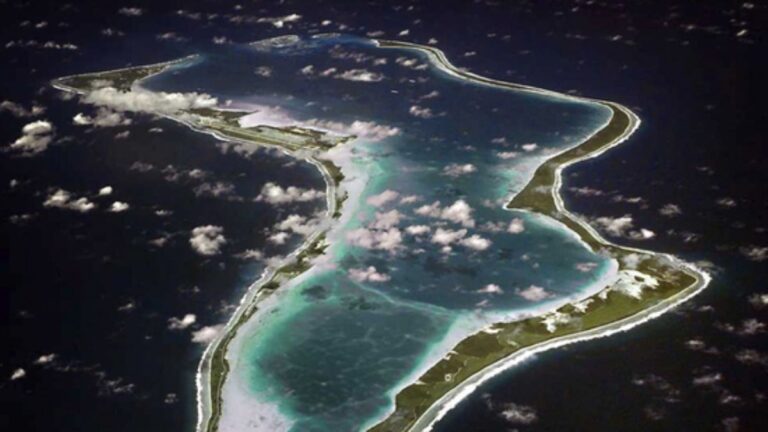With both the International Court of Justice (ICJ) and the International Tribunal for the Law of the Sea (ITLOS) recognising the Chagos Islands as belonging to Mauritius and affirming the UK’s obligation to return them- the Islands were finally set for handover, until a last-minute High Court ruling blocked the deal.
For more information visit Newzscoop.
What happened at Midnight on May 22nd
In the early hours of May 22, 2025, at 2:25 a.m., UK High Court judge issued an emergency injunction that temporarily blocked the UK government to transfer the sovereignty of the Chagos Islands to Mauritius.
The order passed by Mr Justice Julian Goose stated that the government may take no conclusive or legally binding step to conclude its negotiations concerning the possible transfer of the British Indian Ocean Territory, also known as the Chagos Archipelago, to a foreign government or bind itself as to the particular terms of any such transfer.
But when the government had clearly emphasised the critical importance of the deal, stating that it was “absolutely vital” for the safety and security of the British people, why did the judiciary intervene at the last moment?
This was in response to a last minute legal challenge raised by a Chagos-born British national, Ms Bertrice Pompe who who claimed that the accord would violate the rights of the indigenous people of the Chagos Islands who have not been properly involved in the negotiations.
About The Overlooked Concerns Of Chagossian People
Ms Pompe, who is a Chagossian activist had filed a case against the Foreign office regarding the handover deal of Chagos Islands between the UK and Mauritius.
According to her belief, the British government was acting with disregard for the human rights of the Chagossian people. She had also argued that the success of the deal would amount to a breach of the Human Rights Act and the Equality Act.
Michael Polak, the lawyer for the two women stated, “The government’s attempt to give away the Chagossians’ homeland whilst failing to hold a formal consultation with the Chagossian people is a continuation of their terrible treatment by the authorities in the past.”
The Scenes Outside The UK High Court
The situation outside the court remained tense, with visible anger and protest despite the interim relief granted by the court to the claimants.
Dozens of protesters had gathered outside the central London court after the ruling, where at one point they could be heard chanting “no retreat, no surrender”. A Chagoassian activist named Lisette Talate stated, “I’m here today to fight for my right. I don’t want Mauritius to take over my island.”
Not just her, many members of the Chagossian community, many of whom were displaced from their homeland decades back, came in big crowds outside the court to voice their opposition to the deal;, holding placards, waving flags, and expressing their frustration over being excluded from the negotiations. They kept this view forward that the agreement lacked provisions for their right to return to the islands, particularly Diego Garcia, which remains a strategic military base even today.
The Deputy leader of Reform UK, Mr Richard Tice joined the demonstrators as well. He showed his support by tearing up a copy of the deal in front of the crowd, bluntly labeling it as a “sell out” of British sovereignty.
Michael Polak, a barrister representing the Chaggosian activists- Miss Pompe and Bernadette Dugasse, said his clients were both disappointed by the decision.
However, the Government insisted that the Chagos Islands deal is the “right thing” for the UK.
And just hours later, the tide turned-
The injunction was lifted at the daybreak and the Chagos Islands deal between the UK and Mauritius moved ahead, marking an end to the history of dispute between the two nations.
Sovereignty Of The Chagos Islands Transferred
Following an urgent hearing on the morning of 22nd May, Justice Martin Chamberlain, a new judge reviewed the case and lifted the injunction.
He stated that the public interest and the interests of the United Kingdom would have been substantially prejudiced if the interim relief had been maintained.
Thus, the UK government formalised a landmark agreement that confirmed the transfer of the sovereignty of the Chagos Archipelago- a cluster of over 60 small islands in the Indian Ocean, to Mauritius.
The UK Prime Minister Keir Starmer signed the sovereignty transfer agreement with Mauritius.
According to this agreement, the strategically significant island of Diego Garcia which is the home to a major US military base- will also come under Mauritian sovereignty, though the UK and the United States will be retaining an operational lease of Diego Garcia under a 99-year lease agreement with Mauritius.
The deal includes:
an annual payment of £101 million that the UK will make to Mauritius,
a non-interference clause that ensures Mauritius will not obstruct military operations on the island,
a joint oversight body that will monitor compliance,
and all the existing defence and security agreements that will remain in force.
Also, the agreement establishes a £40 million fund to support the displaced Chagossian community and will allow limited resettlement within the archipelago, excluding Diego Garcia.
The deal thus seeks to balance geopolitical interests with long-standing sovereignty claims and community restitution.
PM Starmer’s Take On The Handover
The UK PM Keir Starmer conveyed from UK’s Northwood military headquarters-
“President Trump has welcomed the deal along with other allies, because they see the strategic importance of this base and that we cannot cede the ground to others who would seek to do us harm.”
“If we did not agree this deal the legal situation would mean that we would not be able to prevent China or any other nation setting up their own bases on the outer islands or carrying out joint exercises near our base. No responsible government could let that happen,” he declared.
But as the dust settles on this landmark agreement, one question remains- is this decision actually about justice, international legality, and the People or about strengthening geopolitical strategy and international influence?
Well, no documents or declarations would suffice; only time – over the next 99 years will be able to really reveal what lies beneath this decision.


